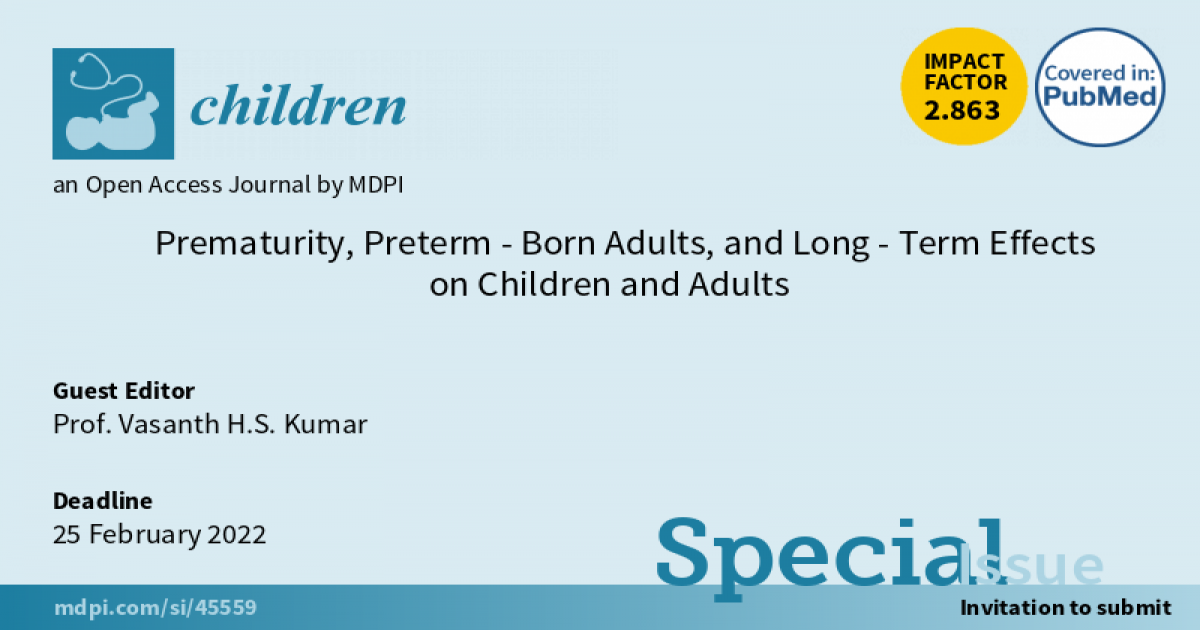Prematurity, Preterm-Born Adults, and Long-Term Effects on Children and Adults
A special issue of Children (ISSN 2227-9067).
Deadline for manuscript submissions: closed (25 July 2022) | Viewed by 54564

Special Issue Editor
Interests: BPD and hyperoxic lung injury; pulmonary hypertension; resuscitation; long-term effects of prematurity
Special Issues, Collections and Topics in MDPI journals
Special Issue Information
Dear Colleagues,
Advances in neonatal care have led to improved survival of premature infants with a concurrent increase in the incidence of preterm birth across the world. The spectrum of preterm infants extending from extremes of gestational age to the late preterm infant is at higher risk of adverse short-term and long-term outcomes. Some of these problems may not show up for considerable periods, even into adulthood. Management of short-term outcomes such as bronchopulmonary dysplasia (BPD) and necrotizing enterocolitis (NEC) is further challenged by a broad spectrum of related long-term morbidities and neurodevelopmental issues in these infants.
Adults born preterm are at higher risk of neurobehavioral and adult-onset morbidities compared to term infants. The Special Issue will address problems relating to prematurity as infants grow into adults. Cardiorespiratory morbidity such as BPD, asthma, lung function, and pulmonary hypertension, organ-specific health issues (poor feeding, gastrointestinal, metabolic, and renal morbidities), or outcomes relating to neurodevelopment are of interest. Caffeine, oxygen, nutrition, and other factors that influence the growth and development of preterm infants are considered. Newer strategies, including machine learning and unique approaches such as bridging pediatric and adult programs to address research gaps in longitudinal assessment and management of premature infants, contributing to improved survival and long-term outcomes as they grow into adults, are of interest.
We welcome articles from across the globe on all matters relating to prematurity and long-term health to better the lives of these infants. Both reviews and original research will be considered for publication. The authors are welcome to contact the editor directly at vkumar3@buffalo.edu for questions or clarifications.
Prof. Vasanth H.S. Kumar
Guest Editor
Manuscript Submission Information
Manuscripts should be submitted online at www.mdpi.com by registering and logging in to this website. Once you are registered, click here to go to the submission form. Manuscripts can be submitted until the deadline. All submissions that pass pre-check are peer-reviewed. Accepted papers will be published continuously in the journal (as soon as accepted) and will be listed together on the special issue website. Research articles, review articles as well as short communications are invited. For planned papers, a title and short abstract (about 100 words) can be sent to the Editorial Office for announcement on this website.
Submitted manuscripts should not have been published previously, nor be under consideration for publication elsewhere (except conference proceedings papers). All manuscripts are thoroughly refereed through a single-blind peer-review process. A guide for authors and other relevant information for submission of manuscripts is available on the Instructions for Authors page. Children is an international peer-reviewed open access monthly journal published by MDPI.
Please visit the Instructions for Authors page before submitting a manuscript. The Article Processing Charge (APC) for publication in this open access journal is 2400 CHF (Swiss Francs). Submitted papers should be well formatted and use good English. Authors may use MDPI's English editing service prior to publication or during author revisions.
Keywords
- Bronchopulmonary dysplasia
- Hyperoxia
- Prematurity
- Caffeine
- Asthma
- Adults born preterm
- Growth
- Neurodevelopment
Benefits of Publishing in a Special Issue
- Ease of navigation: Grouping papers by topic helps scholars navigate broad scope journals more efficiently.
- Greater discoverability: Special Issues support the reach and impact of scientific research. Articles in Special Issues are more discoverable and cited more frequently.
- Expansion of research network: Special Issues facilitate connections among authors, fostering scientific collaborations.
- External promotion: Articles in Special Issues are often promoted through the journal's social media, increasing their visibility.
- Reprint: MDPI Books provides the opportunity to republish successful Special Issues in book format, both online and in print.
Further information on MDPI's Special Issue policies can be found here.






